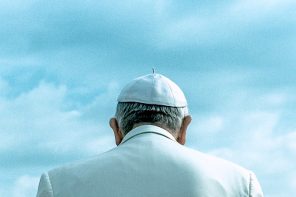Late last month, two global authorities signaled their positions on gender, sex, and the rights of transgender individuals.
One of those authorities was the World Health Organization. The other was the Pope. The difference between their two approaches illustrates a growing rift between scientific authorities and some religious leaders.
The Pope’s comments came during a question and answer session with bishops in Krakow. A Vatican-translated transcript of the conversation, which began to circulate last week, shows the Pope describing “forms of ideological colonization” including “[the ideology of] ‘gender.’”
“Today children—children!—are taught in school that everyone can choose his or her sex,” the Pope continued. “God created man and woman; God created the world in a certain way… and we are doing the exact opposite,” he said, referencing a conversation he had with Benedict, the pope emeritus.
Francis has made some highly-publicized gestures toward queer and trans Catholics, but these comments about the “ideology of gender” aren’t exactly new for the pontiff.
The timing of these particular remarks, though, was striking. The day before the Pope spoke in Krakow, the journal Lancet Psychiatry published a major new study that could help push the World Health Organization to stop classifying transgender identity as a mental disorder.
The study was designed to address upcoming changes to the WHO’s diagnostic classifications. Its corresponding author is one of the experts helping to write those influential global standards.
Transgender people often report anxiety, depression, and other kinds of psychological distress. The research team wanted to understand how much of that distress was linked to the feeling of incongruence between an individual’s gender and biological sex, and how much of that distress could be linked to stigma, violence, and other kinds of social rejection.
Quick caveats: these are very subjective measures. Individual experiences are diverse. And scientists are not the Authoritative Sources on the experiences of transgender people (or of any people, for that matter).
Still, diagnostic categories are powerful. The researchers interviewed 250 transgender individuals in Mexico City. They found that their distress was overwhelmingly correlated with violence and social rejection, but not with anything intrinsic to being transgender.
Ergo, they conclude, it’s not a great idea to classify transgender identity as a disorder.
A medical diagnosis can provide social legitimacy to people’s experiences, and it can provide access to legal and insurance protections. But diagnoses can also carry a stigma and limit access to some kinds of services. There are other ways to medically recognize an experience. And there’s something deeply unfair about calling someone disordered primarily because they’re treated unjustly by a society that calls them disordered. As the paper’s authors write:
…it seems appropriate for us to consider as a field how labelling responses to social rejection and violence as a form of psychopathology and then conceptualising these as intrinsic to the individual and justifying the diagnosis of a mental disorder contributes to the perpetuation of this victimisation.
If it formalizes this change, the WHO wouldn’t be the first influential medical body to do so. In 2012, the American Psychiatric Association decided to reclassify “gender identity disorder” as “gender dysphoria” in the Diagnostic and Statistical Manual of Mental Disorders, or DSM.
In other words, the Lancet Psychiatry paper was an important datapoint in a larger shift toward a medical consensus that treats transgender identity as a common, scientifically-recognizable, non-disordered human experience.
Which brings us back to the Pope. The leadership of the modern Catholic Church has prided itself on its respect for scientific consensus. The Vatican has admitted that Galileo was right (a little late, but still), worked hard to reconcile its doctrines with Darwinian evolution and the concept of the Big Bang, and embraced the scientific consensus on climate change.
Of course, defining human experience isn’t quite the same as measuring the level of the ocean. Psychological definitions are openly subjective—and reflective of ideology—in a way that a theory of evolution or a model of climate change is not.
Still, this is what it looks like when a major religious authority parts ways with an emerging scientific consensus. At the very moment when medical authorities are moving to normalize and naturalize transgender experience, the pontiff is suggesting more forcefully that the unlinking of gender and biological sex is abnormal or against the created order.
Certainly, conversations about personal autonomy, choice, and rights have a place at the table here. And reflecting medical orthodoxy isn’t exactly the Vatican’s primary concern. But the opinions of religious authorities do change to reflect the evolution of social norms and political realities.
For now, though, it’s an open question whether the Pope will continue to publicly dismiss this so-called ideology, instead of engaging directly with the many ways that people describe and categorize experiences of gender. And while psych researchers won’t go the way of Giordano Bruno, they may wonder whether it’s just a matter of time until the Vatican will listen.
* * *
Also on The Cubit: The politics of imaging life in the womb
Follow The Cubit, RD’s religion-and-science portal, @TheCubit




